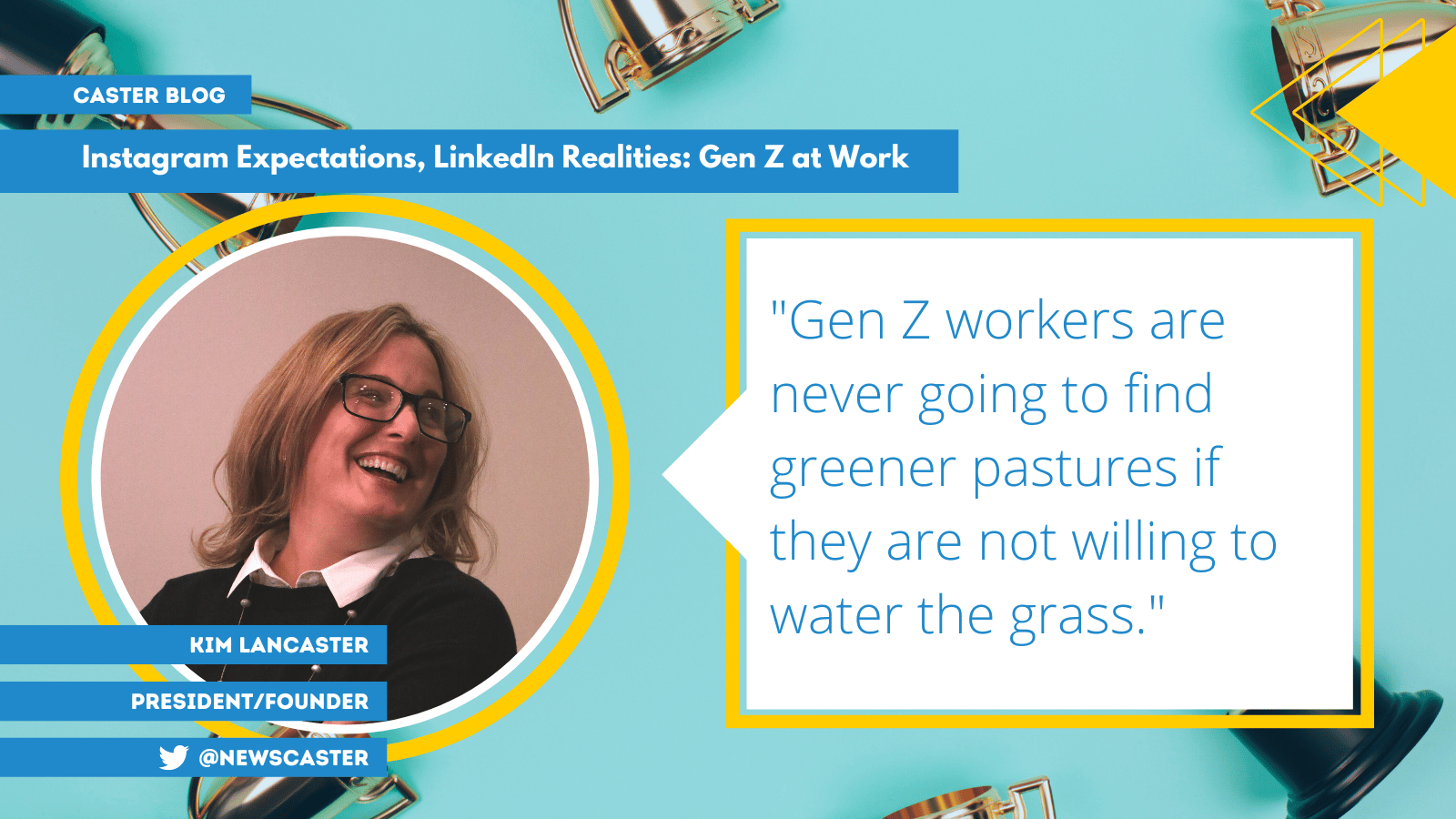
Instagram Expectations, LinkedIn Realities: Gen Z at Work
Gen Z is moving the goalposts for workplace culture: demanding more flexibility, focusing more on work-life balance, seeking different kinds of satisfaction from their jobs, and quitting fast if their current role falls short. Many media observers report on this behavior, even praise it, without pausing to critically evaluate whether it’s good.
Insider writes: “Because Gen Z is less motivated by financial success, many are driven by an entrepreneurial side to make a difference in the world.”
I couldn’t disagree with this statement more. Gen Z is simply less motivated, period.
This is the do-it-for-me generation. Gen Z expects to be accommodated and praised for showing up. For their sake and the sake of businesses everywhere, we need to stop lying to them about whether their work habits and attitudes are healthy and sustainable.
The Big Sad
Gen Z reputedly cares more about work-life balance and personal well-being, and is more open to talking about mental health. But where is this concern and discussion getting them? Even pre-pandemic, Gen Z has higher rates of depression than previous generations.
This generation is smartphone-obsessed. Starting in 2012, smartphone usage for social media and depression started to increase at disturbingly similar rates. In a Deloitte report that surveyed 23,000 Gen Zers and millennials, nearly half of Gen Z (46%) said that they feel stressed or anxious. This seems on-brand. Real life looks nothing like Instagram, and expectations built on the social media fantasies are bound to lead to feelings of unfulfillment.
This terminally online generation prefers to be onlookers of life rather than participants – hence, the work-from-home mentality. Gen Z is more comfortable interfacing through a screen than in person. The pandemic hasn’t helped – many recent college grads entered the workforce convinced that they could learn or do anything from their living room couch.
Entitled ≠ Innovative
A study of 1,000 Gen Zers by the Center for Generational Kinetics found that 62% of Gen Z plans to start or possibly start their own business in the future.
THIS IS INCREDIBLY, HILARIOUSLY NEVER GOING TO HAPPEN. So, if I understand the media, the most stressed and anxious generation, the generation who doesn’t want to meet their co-workers and prioritizes their personal life over a job (even a great job with all the perks)– that generation is going to innovate more than the generations that brought us the automobile, the internet, electric vehicles, social media, and Roe V Wade?
How? Apparently, vibes. Emma Havighorst, a 2020 graduate, told Insider, “Gen Z is innovative and powerful,” and “The way we see the world is very different from prior generations.”
Unfounded confidence will only get you so far. At a certain point, you have to actually run a business, which takes prioritization, financial savvy, and dedicated, meaningful work. In my observation, Gen Z is sometimes willing to put in the hours, but they don’t know what contributing to the bottom line of a business actually means. They expect to be rewarded equally whether or not they make a substantive contribution. They don’t realize it costs money to run a business and make payroll; they don’t appreciate the premium an employer pays for health insurance; they don’t even know how to account for paid time off because it’s expected rather than earned, and nothing expected has value. Previous generations have gone through recessions and worked multiple jobs to make ends meet. They might change jobs because the opportunity was finally in their favor, but never on a whim. Gen Z has learned, if they complain loud enough, accommodations will be made.
Appeasement Hurts Everyone
We are all going to pay the price for bending to Gen Z’s preferences. Those who do want to go into the office because they value mentorship and interaction are ridiculed for their preference, while the rest of us are being forced into an aloneness we didn’t choose. Aloneness isn’t the same as loneliness, and loneliness isn’t the same as depression. But more aloneness (including social media rabbit holes) and more loneliness (including work from home) might have combined to push up sadness among Gen Z, who need socialization to protect them from the pressures of a stressful world. We cannot rule out the possibility that people are sad about the world, not only because the world contains sadness, but also because young people are constantly ingesting news, op eds, and social threads telling them they should be depressed about it.
In the 2020 Atlantic feature “What Happened to American Childhood?,” Kate Julian described a phenomenon that affects families a bit more broadly but is carrying into today’s workforce: Anxious parents, in seeking to insulate their children from risk and danger, are unintentionally transferring their anxiety to their kids.
In the past 40 years, American parents—especially those with a college degree—have nearly doubled the amount of time they spend coaching, chauffeuring, tutoring, and otherwise helping their teenage children. As a result, children are growing up slower than they used to. Today’s children are less likely to drive, get a summer job, or be asked to do chores. As Julian wrote, these activities provide children with two very important things: tolerance for discomfort and a sense of personal competence. When they miss out on these milestones of independence, young people enter the workforce both more anxious, and less able to absorb feedback or suffer through the pain of learning a difficult new skill.
In this same timeframe, researchers have noted a broad increase in an “accommodative” parenting style, which seems to be translating to the workforce as these kids age out of home life. If a girl is afraid of dogs, an “accommodation” would be keeping her away from every friend’s house with a dog. Activities are structured around her comfort, as opposed figuring out how to conquer her fear or stress. Send this same kid into the workforce with a manager who expects them to show up on time, work with their team, and produce, all while getting feedback on how to do their job and be an adult, and she has a total meltdown from stress that the rest of us have learned how to handle.
Gen Z is now the youngest workforce contingent, and they are bringing their coddled habits into the office. It’s no surprise that this generation is leading the Great Resignation alongside millennials. But many are also experiencing “shift shock” after starting their new job, realizing that it wasn’t what they thought it would be. (HAHAHAH, nothing ever is kids– see comment re: Instagram.)
Hate Your New Job Too? Surprise, Surprise.
A 2022 survey of more than 2,500 workers by The Muse found that 72% of jobseekers said they experienced shift shock after starting their new role.
Kathryn Minshew, The Muse’s cofounder and CEO, defined “shift shock” as starting a new job only to discover, with surprise or regret, that the position or company is different from what you thought it would be. Those who find themselves unpleasantly surprised by a new job frequently try to reverse course: 48% of those survey say that if they experience “shift shock,” they would try to get their old job back. Before quitting a pandemic-era job, this generation would be advised to consider: an employer that has already witnessed their flaws and failings, and didn’t fire anyone when times were tough, may be the best person they will ever work for.
It’s all part of today’s culture, where people prioritize the need to be heard and place blame over the need to listen and grow. Quitting a job is an employee’s easiest way to express their disapproval with their manager or the company. Many young workers, deafened by an echo chamber of glossy social media and aspirational video blogs, jump ship at the slightest impetus. They think it’s better somewhere else, only to lose what they value most in their previous job. Let’s be real: Gen Z workers are never going to find greener pastures if they are not willing to water the grass.

